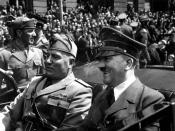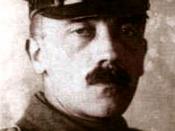An English historian, Lord John Acton once said, "Power tends to corrupt and absolute power corrupts absolutely." Throughout history this has been true in many cases. For example Adolf Hitler who abused his power and killed many Jews. In William Golding's Lord of the Flies, he shows us through Jack, other characters and symbolism how wanting power can cause the sinful downfall of even a few twelve year old boys. When left on the island the boys are becoming more and more savage and wanting more and more power.
At the beginning of the novel, Jack and Ralph have a election to vote for chief. Ralph wins while Jack is left a little embarrassed. Ralph, seeing that Jack does have a gift to lead, appoints him and his choir hunters. "The circle of boys broke into applause. Even the choir applauded; and the freckles on Jack's face disappeared under a blush of mortification.
He started up, then changed his mind and sat down again while the air rang. Ralph looked at him, eager to offer something." (Golding 23) Since Ralph felt sorry he gave this position of power to Jack. It might've have been a bad idea because he might start wanting more power which does happen later on. Being hunters they also might start to like killing things which leads to corruption.
As the novel progresses, Jack starts disagreeing with Ralph. Ralph is more worried about being rescued then killing pigs and eating meat. "His mind was crowded with memories; memories of the knowledge that had come to them when they closed in on the struggling pig, knowledge that they had outwitted a living thing, imposed their will upon it, taken away its life like a long satisfying drink." (Golding 70) Eating meat wasn't necessary to live on...


